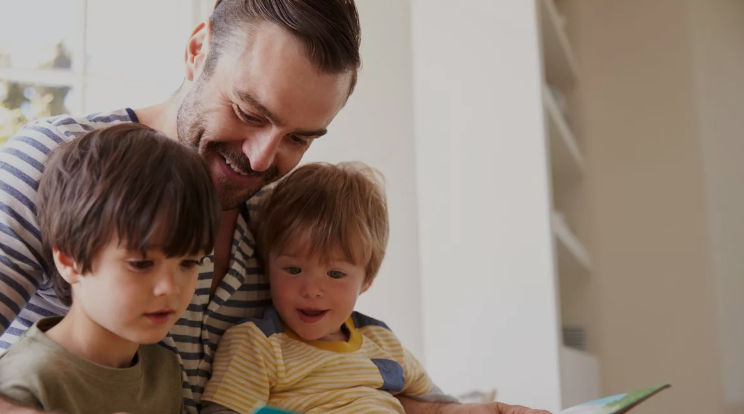


 1:58:8
1:58:8  2025-01-09
2025-01-09  953
953

((The tipping point for me was when Dr. Markham talked about parenting with a full cup. If we start the day empty, we have nothing to give our children. Finding ways to replenish my energy was vital, so I woke up every morning at 6 a.m. and went for a walk by myself. It helped me recharge and focus so that I was ready to meet the demands of the day and the needs of my children. Going on play dates with friends was also vital, so I joined some groups at my church to make sure we all got the “me time” we needed.))
-Amanda, mom of a 4-year-old and a 1-year-old
The number one goal for parents everywhere? To be more patient. But having to summon your patience is a sign that your cup is already dangerously empty. You can’t rely on willpower alone. The real task is to keep your cup full so that you have plenty of joy and presence to share with your child. Children love our cheerful presence, and they become happier and more cooperative. If you find yourself frequently upset, drained, or exhausted, if your mind-to-body dialogue is mostly negative about your child, or if you regularly yell at your child, you are likely suffering from what I call “Sacrificing Yourself on the Altar of Parenting Syndrome” (SAP). This happens when we forget to give ourselves the attention we need. Feeling deprived doesn’t work for us. It kills our innate joy. And it doesn’t work for our children, either, who end up with a resentful, negative, and impatient parent. (Guess if that makes the kids behave.) You are, after all, responsible for how you spend the short life you’ve been given. If you’re unhappy, you’ll have no one to blame but yourself on your deathbed. The secret mission of adults is that we’re still growing, and parenting forces us to learn to parent ourselves just as we parent our child. If you’re old enough to have a child, your parents are off the hook. You’re now your responsibility. And you deserve all the love you’re lavishing on your newborn. Giving ourselves that love changes how we parent—and changes our lives.
Does that mean telling your child to stop meeting his or her needs, and that it’s time to put your own first? No, of course not. Parenting is about nurturing your child, which means noticing what he or she needs and making sure he or she gets it. You’re the adult in this relationship, after all. But we can only be confident parents to the degree that we “nurture” ourselves.
It’s partly about changing what you do: nurturing yourself in small ways throughout the day. It’s partly about changing your mindset: finding peace within yourself. The key is to nurture ourselves as best we can every moment of the day, just as we do with our children. To honor our own needs as well as theirs. The bad news is that it takes work. But that work—the inner work of embracing ourselves with compassion—is what changes us. Here’s how:
* Get into the habit of listening to yourself as much as you can throughout the day. Just take a deep breath, and let it wash over your body. Breathe in the calm, and breathe out the stress. Just being present with yourself is a basic form of “caring” that we all need.
When you’re feeling overwhelmed
* Focus on what matters. Did you feed your kids? Did you hug them and tell them how much you love them? Kids sense when we’re stressed and disconnected, and they lash out, so a hug can often bring them back to their best selves, too.
* Find support Parenting is the hardest thing a human being can do. We all need more support. As essayist Anne Lamott says, “Sit yourself through the day as you would a loved one with a mental illness: with a great sense of humor and lots of little treats.” I don’t mean more cookies. A hug from your child (even if they’re not perfect!). Find someone you can vent to about how hard it’s been (someone who won’t try to fix you or your child).
* Support yourself. Talk to yourself like you would a loved one. Hang motivational messages around the house to lift your mood. Leave dishes in the sink and let them soak for a long time. Give yourself permission to watch the sunset before you go to bed, find three things you appreciate about yourself and get enough sleep.
* When you lose your temper, use it to your advantage. Okay, you’ve done something wrong and it’s over. Use it, then, as an opportunity to teach a life lesson in how a mature person apologizes, reconciles and makes amends. Every crisis is an opportunity for rapprochement as long as you’re willing to see things from both sides, with an open heart.
* Start over. When you find yourself starting to raise your voice, stop, breathe and say, “I’m so sorry, that’s my temper talking… Let’s start over… Here’s what I meant to say…” This way you take responsibility for your outburst so your children don’t feel like they’re bad people. You set an example so they can correct themselves too.
* Appreciate your child. Even if they’re driving you crazy, there’s something you love about them. And when you notice, it’s like you’re saying, “More of this, please.” And it will blossom accordingly.
* Never turn your back on him emotionally. Your child is counting on you to hold on to the best version of herself. If she feels you’ve lost hope in her, she’ll lose hope in herself. Has she lost her way? Go get her. But don’t join her on her winding path. Embrace her with love, and she’ll join you on the right path.
* Just keep choosing love. If you pay attention, you’ll notice that life keeps giving you choices. Should you be harsh with your child because you’re afraid that if you don’t, he won’t learn? Should you prove to your husband that you were right? Every choice, at its core, is a mix of love and fear. Choose love whenever you can. Every day, you have new opportunities to interact with your child in ways that heal both of you. Your life is the sum of your choices. Some of your choices will be bad, inevitably. But every choice changes the equation of your life.
And of course, if every day feels hard, it’s a sign that you need to change something in your life. You deserve to feel good, and your child deserves the best of you, not the rest of you. * Whenever you find yourself getting more and more frustrated and irritable, stop. Ask yourself, “What do I need right now to stay balanced?” Then give it to yourself—whether your child is around or not. (Five minutes to sit on the back steps listening to the birds? A glass of water? If you can’t do it right now, schedule it for yourself later. (A shower after the kids go to bed? A drink with your partner? More sleep tonight?)
* Notice the tough times of the day and find ways to nurture yourself during them. It’s your life and you’re in control, whether you feel like it or not. Allowing yourself to be the victim doesn’t help your kids. Is bedtime driving you crazy? Make a plan to improve it, whether it’s sharing responsibility with your partner, starting earlier, setting a schedule, getting more sleep for yourself, or enjoying a cup of tea while you read to your child.
* Soak up the beauty and joy of each moment as much as you can. Stop rushing and enjoy your child’s laughter, the smell of their sweet hair, the joy of your daughter mastering something new. “Smelling the roses” nourishes your soul. It makes life worth living. It’s your presence that inspires. Your children to communicate and cooperate. This addresses the “sacrificing yourself on the altar of parenting syndrome.”
Reality Of Islam |
|

Some 1.2 bi

A tiny robo
 9:3:43
9:3:43
 2018-11-05
2018-11-05
10 benefits of Marriage in Islam
 7:5:22
7:5:22
 2019-04-08
2019-04-08
benefits of reciting surat yunus, hud &
 9:45:7
9:45:7
 2018-12-24
2018-12-24
advantages & disadvantages of divorce
 11:35:12
11:35:12
 2018-06-10
2018-06-10
 6:0:51
6:0:51
 2018-10-16
2018-10-16
 8:21:9
8:21:9
 2018-06-21
2018-06-21
 4:25:57
4:25:57
 2023-02-11
2023-02-11
 6:14:17
6:14:17
 2018-06-21
2018-06-21
 10:47:11
10:47:11
 2022-11-22
2022-11-22
 1:16:44
1:16:44
 2018-05-14
2018-05-14
 7:45:39
7:45:39
 2018-06-21
2018-06-21
 11:34:48
11:34:48
 2022-06-29
2022-06-29
 5:41:46
5:41:46
 2023-03-18
2023-03-18
| LATEST |